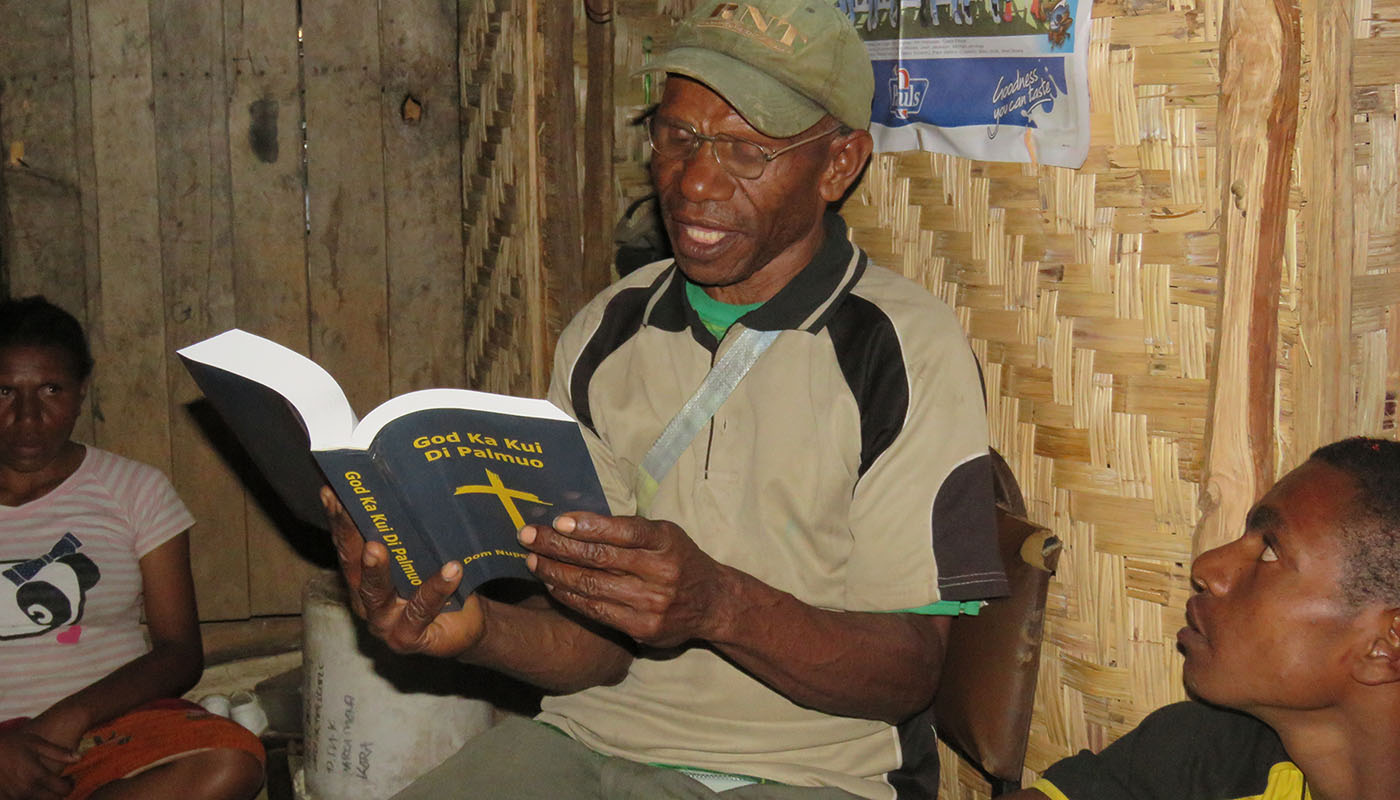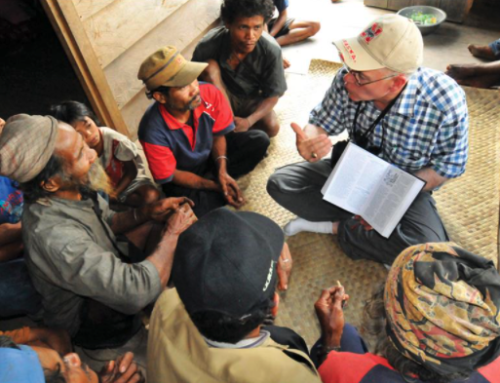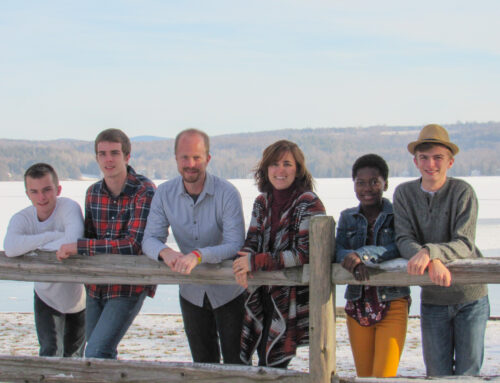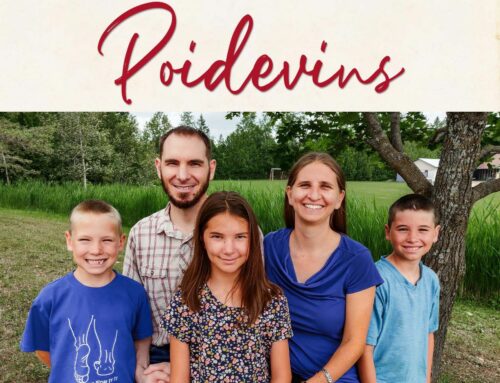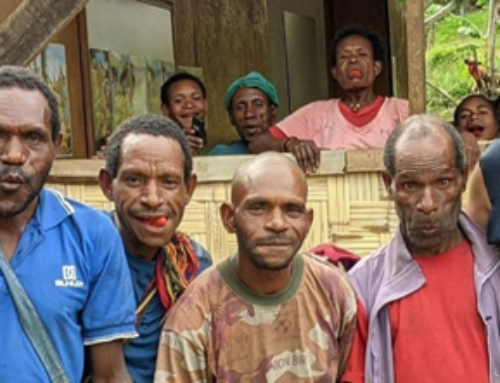“Kaminsungwe! Kaminsungwe!”
“The rain is coming, the rain is coming.” These loud cries would bellow across the mountains, as storm clouds grew on the horizon to announce the onset of the much-awaited rainy season.
There in the pristine highlands of Papua New Guinea, where I had the unique privilege of growing up, these clouds might have appeared ominous at first, but they marked the end to a long dry season when the ground grew parched and the gardens were increasingly barren of sweet potatoes and other vegetables needed for daily sustenance.
With the torrential downpour but moments away, Dom tribal men with booming voices would call out to each other across the valley so that the other villagers had time to rush home from their gardens before the wall of water came crashing down. As a young boy, I remember my twin brother and I racing in competition to beat the rain, hearing the pitter-patter, pitter-patter behind our dirty bare feet as we ran, the sounds of droplets beginning to hit the corrugated tin roof, and breathing a sigh of relief as we managed to sneak inside our front door, just as the water fell behind us.
The rain had come, and there was literally nothing you could do to stop it, and the people were rejoicing as a season of refreshing had arrived.
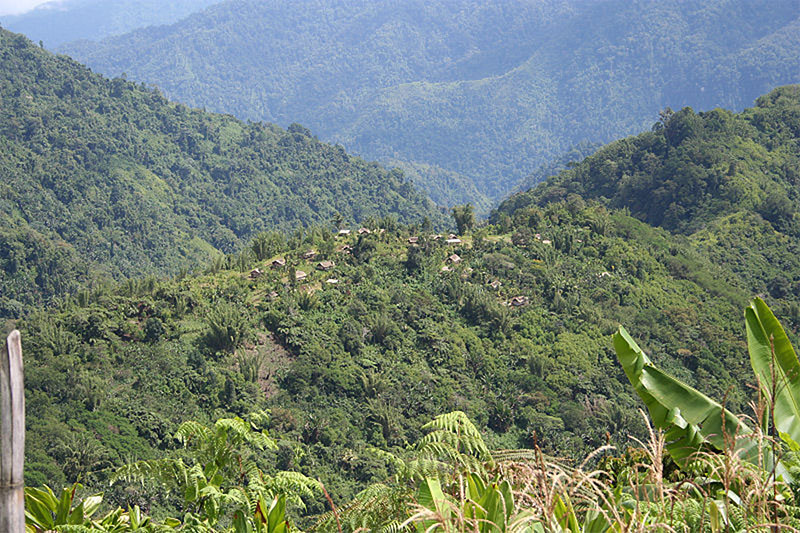
A Dao hamlet
The Dom People are One of Hundreds of People Groups
The Dom people, as they call themselves, are just one of more than 800 different tribes with their own distinct language and culture who live in small hamlets dotting the mountainsides and stretching down to the humid plains on the coast. Lost in time and ruled by their animistic belief system, it’s hard to believe in this day and age that there are still hundreds of these languages waiting for God’s Word to be translated into their own tongue.
The barriers are many to reaching them with the gospel. Despite Christ’s last command to “Go,” there are still so few who are willing to leave the comforts of home to respond to the cries of the unreached.
It All Started With Grandmother
My grandmother, Dora Chamberlain, was one whose heart beat with a passion for missions, although she was never to go herself. I thank God for her prayers. From my perspective this is where the story truly begins. Only Heaven will bear witness to the impact of praying saints like her who, until the day she died at a ripe old age of 99, never missed praying over the letters of missionaries from all over the world who she interceded for so faithfully. Even the renowned missionary Gladys Aylward had been one of her pen pals.
After World War I she longed herself to leave the shores of the UK and go to Sudan to serve in missions. Unfortunately for her this wasn’t to be. The barriers for a single lady and one lacking education in those days were many — and soon another war was taking place. After her marriage to my grandfather, Charlie, and beyond World War II, her passion for the Lord and for missions never waned. She began to pray fervently that one of her three children would serve the Lord as a missionary.
My mother Brenda was the middle child of three, and from what I’m told, the most rebellious. But God in His goodness had His hand on her life and she was later to be challenged by a missionary speaker who appealed to the crowd that, “The only ability God requires is availability.”
How freeing and motivating that was for her young heart. My mother never felt like she had a whole lot to offer, but if God simply needed an available vessel to work through, then she was more than willing to submit her life into His hands.
The Lord provided a godly husband, and together my parents, Colin and Brenda Lamb, began their journey to Australia for missionary training with New Tribes Mission (where my sister and then my twin brother and I were born). In 1974 they moved to the land to which God had called them, to Papua New Guinea, and more specifically to the Dom tribe, where an outreach had just been established.
Nearly two thousand years ago, the Lord Jesus had the Dom people on His mind as He hung on the cross for their sins. They just didn’t know it yet. Death had been conquered, Satan had been defeated, and yet they still lived in darkness and the daily fear of the evil spirits that ruled in their hearts and minds.
I can still recall, as a child, seeing fear in their faces if they heard an owl hoot at night, particularly if it landed on one of their grass houses —because it meant that someone was going to die. And when someone did pass away, the wailing would go on for days and even weeks. There was an utter hopelessness and fear that the dead person’s spirit might now haunt them if it wasn’t somehow appeased.
My parents began the long and arduous work of learning the culture and language of these precious people, creating an alphabet for them, and then teaching them to read and write this newly written language, so that one day they might read the Word of God for themselves and know the truth that would set them free.
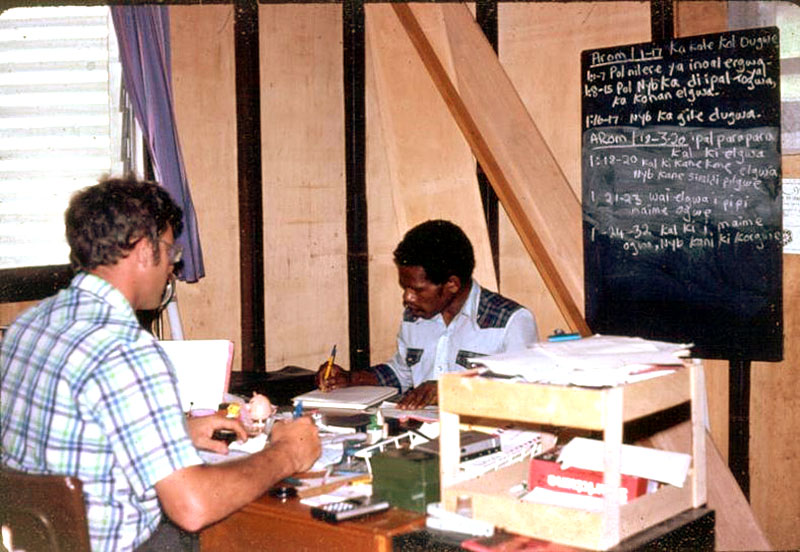
Kapia Joseph helps Colin Lamb learn the Dom language
Discovering How to Say Grace
How does one even begin to bring the gospel to people who don’t even have a word for love or for grace or for forgiveness in their language? I asked my father recently to recount the day that he discovered a hidden principle within the Dom culture by which he could finally articulate the meaning of grace.
We were getting ready for our one-year home assignment. Many of our local people stayed up all night with us in the house. Even when we were tired and began dropping off to sleep they would not let us sleep even though some of them were. Early the next morning we were getting ready to leave. One of our mission colleagues was coming to get us in his truck and drive us to the airport, about a three-hour drive over the mountains.
While we were packing, some of the people came and gave us some gifts for us to take back to England and show to our churches at home. Someone gave us a decorative spear; another gave us a handmade bilum, a lady’s bag; another a highlands handmade axe.
As I was receiving these gifts, I wrote on a piece of paper the name of the person who gave it to us. One of the characteristics of the social interaction of our people was that when someone gives you something, sometime later you owed them something back in return. That is how the culture works. It’s an unspoken “pay-back” system. When I got home to England I was going to get something for each person and sometime after my return I would give it to them.
Well, Kapia Joseph, one of the believers (who was also my language helper) saw what I was doing, and knew why I was doing it. To my surprise, he came and took the paper from me and tore it up. When I asked him why he did that, he said that he knew that I was doing it because I wanted to give them back something for the gift they gave me. He then said that these gifts were “yu one,” pronounced like “u-on-ay.”
I had not heard that phrase before. So I checked the phrase with several older people and found out that the word meant that there was nothing I could do to repay these gifts as they were given totally free and that no payment could be given for them. The people I checked it with said it was almost never used because they always expected something in return for anything that they gave. But these gifts had been given to me totally free, with no expectation of payment in return.
I realized I had just found a wonderful phrase to describe God’s amazing gift of grace!
God Put Together an Unlikely Team
The work continued through many trials and triumphs, and in 1982, when I was 10 years old, Jim and Judy Burdett from California arrived to join my folks in the work. It truly takes a team to get the job done and sometimes God puts complete opposites together.
My father was a reserved British “chap” — stiff upper lip and all that stuff — and Jim a more boisterous “Californian dude,” and yet they made a great team. Of course there were struggles, but they kept short accounts and worked through them in order to establish the Dom church through ongoing teaching, discipleship and translation.
The time together was short-lived however, as a couple years later my father was asked to take on a greater leadership role for the field of Papua New Guinea. We moved out of the tribe to the mission headquarters and Jim and Judy were left to continue on the work alone.
New Testament Completion a Milestone
It was July 2015 when Jim and Judy Burdett reached a milestone in the Dom ministry. The Dom New Testament was finally complete!
Their faithfulness over the years was being rewarded. The Bibles were hot off the press, and although the official dedication wasn’t to be until 2016, they wanted the first printed edition to be delivered into the hands of the eager believers. Since the Burdetts were taking a much needed furlough in the USA, and their new partners were giving birth to their child in Germany, I was given the privilege of delivering the Bibles. My 20-year-old daughter, Cassandra, was absolutely delighted to be able to come with me.
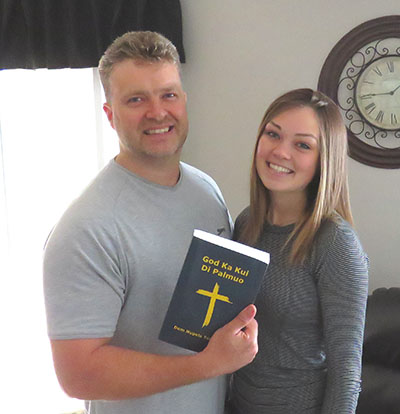 How do I even begin to express the joy that I felt as I considered God’s intimate hand in this for us? He knew it had been the desire of my heart to return and visit our people, but never did I think I would have this privilege.
How do I even begin to express the joy that I felt as I considered God’s intimate hand in this for us? He knew it had been the desire of my heart to return and visit our people, but never did I think I would have this privilege.
The little feet that ran through the wet grass as a young boy would now be given the honour some 40 years later of delivering the Word of God to a people who had been without it for thousands of years.
Scripture says, “How beautiful upon the mountains are the feet of him who brings good news” (Isaiah 52:7). I believe it’s the feet of missionaries like Jim and Judy that are truly beautiful. My hat goes off to them. They, and others, like my parents, who sacrificed to take the gospel “to the uttermost parts of the earth,” are truly my heroes.
As Hebrews says, “the world was not worthy of them” (Hebrews 11:38, NIV).
Why would anyone want to leave the comforts of home to give their life to serve among a strange and difficult people? The only answer can be that “the love of Christ compels us” (2 Corinthians 5:14). His redemptive glory is most revealed as our lives reflect Christ’s love to the peoples of the world for which He died.
And “He died for all, that those who live should live no longer for themselves, but for Him who died for them and rose again” (2 Corinthians 5:15). I wonder what my grandmother would say now if she could see from heaven the fruit of her prayers, that one of her daughters would serve the Lord. And then to see her grandson and now great-granddaughter taking this shipment of Bibles to the Dom. Her faith and her prayers were not in vain and one day we will rejoice together with the Dom people around God’s throne.
The Journey Home Again
It was a hot dusty afternoon in July when my daughter Cassandra and I arrived at the Goroka airport in the central highlands of Papua New Guinea. And who was there to greet us? None other than Kapia Joseph.
Kapia was probably only 14 or 15 years old when he first began helping my father learn the Dom language and translate the Scriptures, and now he was an older man of nearly 60 years, who with an endearing smile on his face quickly embraced my daughter as his own.
“She is now my granddaughter,” he exclaimed with pride as he welcomed us with tears of joy.
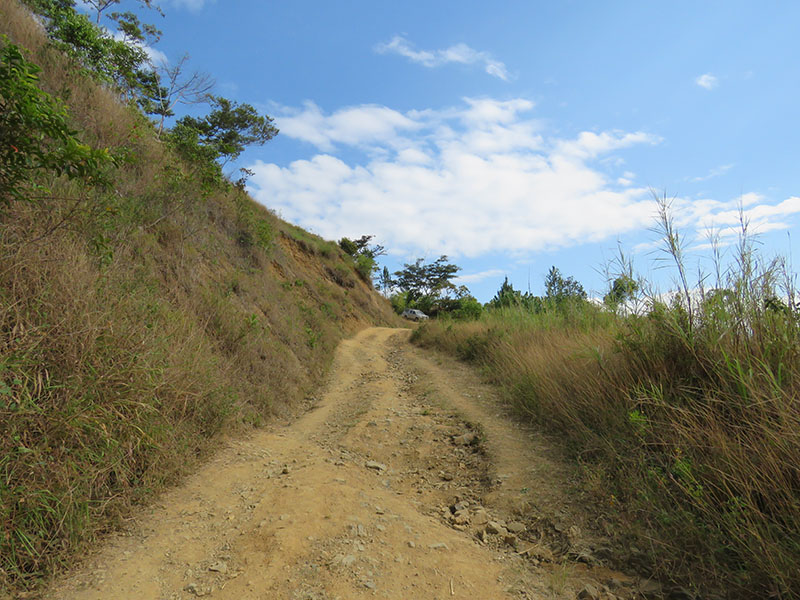
The journey took hours on rutted roads
A few days later, veteran missionary Jim Tanner, whom I had known since I was a child, drove us up into the Chimbu province. A journey that would have taken us only a few minutes on Highway 401 here in Canada, took us a few hours as the roads in some places were more ruts than roads.
As we drove across the valley, the sites of home were coming into view. This is where I had grown up. The Kundiawa airstrip could be seen in the distance across the valley, and soon we arrived at a small village just down the dirt road from where our home used to be. Here we embraced with a number of Dom believers, many whom I hadn’t seen since I was 16 years old. What a joy it was!
To be honest, I hadn’t always seen my upbringing as a privilege. I’m sure many other “missionary kids” would agree. But over the years I have come to appreciate the wealth of life experience that I could never have received in a classroom, and the deepest truths that there is very little worth giving one’s life for — except for the gospel and the souls of men and women who will perish in eternity without it.
God in His sovereignty had knit my life with the Dom people and He was giving me this special gift of being His hands and feet delivering His completed Word to them.
That afternoon we enjoyed a mumu feast together. This is their traditional way of cooking with an assortment of food: vegetable greens, sweet potatoes and a freshly killed pig wrapped together in banana leaves, then put over hot rocks and buried in the earth. There it cooks for a few hours and when it comes out it’s absolutely delicious. At least I thought so; my daughter Cassandra wasn’t quite sure. Her greatest delight was walking hand in hand with the village children who relished her undivided attention and took turns enjoying it.
The Highlight: Reading into the Night
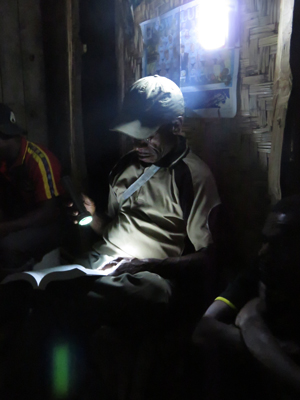 There is so much that I could say about our short time there as we visited a couple of the Dom churches and distributed the Scriptures among them.
There is so much that I could say about our short time there as we visited a couple of the Dom churches and distributed the Scriptures among them.
However, the highlight of this journey for me was sitting in Kapia’s bamboo hut that night as one by one other villagers crammed in to find their spot on the woven bamboo floor. The cool air outside was quite still, other than the sound of crickets chirping in the background, singing their praises under the clear night sky. It’s as if even creation knew this night was special.
We all listened with eager anticipation to Kapia as he held the completed Dom New Testament for the first time in his wrinkled hands and began reading the words of God in his own tongue. With tears of joy from eyes that had grown dim with age, he read on late into the night with only the glow of a flashlight illuminating its pages. What a beautiful picture this was to me of God’s eternal light that was now shining brightly into the darkness.
“God now speaks my language,” he said as he grasped his Bible affectionately! He had waited some 40 years for this moment, and with a thoughtful countenance he recounted the journey that began back in the early ’70s as my father’s language helper, and now as an elder in the church working alongside Jim and Judy Burdett.
He went on to share his burden for the Dom people: that this Book of Life would now be read by all, and that God would raise up men and women who could disciple others even beyond the Dom to neighbouring tribes.
The Rain Has Truly Come
As I reflect back on the rain clouds gathering on the horizon to mark the end of the dry season, cries of “Kaminsungwe” — “the rain is coming” — ring in my ears, and my prayer for the Dom church is that truly a season of refreshing will come.
The Lord says in Isaiah 44:3, “For I will pour water on him who is thirsty, and floods on the dry ground; I will pour My Spirit on your descendants, and My blessing on your offspring.”
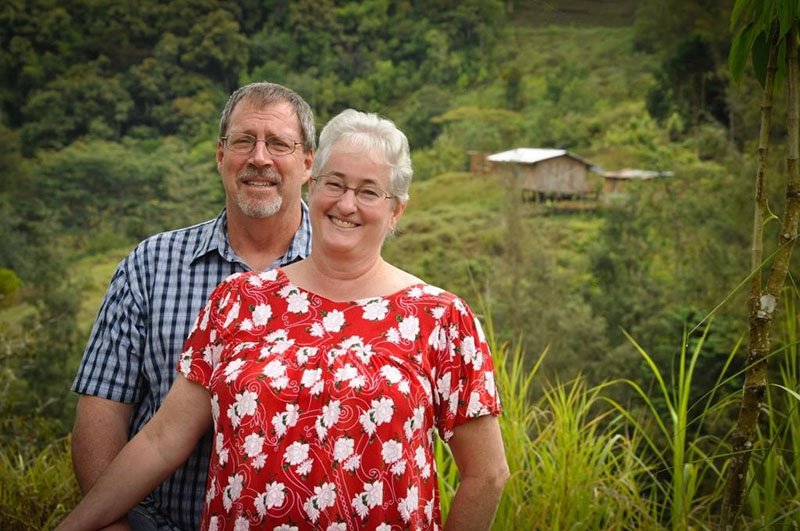
Jim and Judy Burdett
There is still much work left to be done as Jim and Judy Burdett, and the team there, look forward with anticipation to the official dedication of the Dom New Testament this coming August.
Pray with us for the Dom church, that the Holy Spirit by His infinite grace “might sanctify and cleanse her with the washing of water by the word, that He might present her to Himself a glorious church, not having spot or wrinkle or any such thing, but that she should be holy and without blemish” (Ephesians 5:26-27).
—Martin Lamb currently serves as Director of Public Relations with NTM Canada

